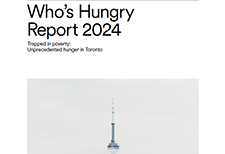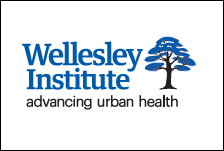Discover financial empowerment resources
Discover financial empowerment resources
In partnership, Daily Bread Food Bank and North York Harvest Food Bank have released Who’s Hungry 2024 – an annual profile of poverty and food insecurity in the City of Toronto. In the last year, there were 3.49 million client visits to Toronto food banks – nearly 1 million more visits...

Financial empowerment (FE) is an approach to poverty reduction that focuses on improving the financial security of people living on low income. Evidence shows that embedding FE interventions into municipal welfare, employment, housing, shelter and health services can significantly boost service...

Recover and Rebuild: Helping Canadians build financial security during the pandemic and beyond The 2021 ABLE Financial Empowerment (FE) virtual series is a collection of online financial empowerment events designed to provide frontline FE practitioners, FE stakeholders, policy-makers and...

This is the final report on the MPower Money Coaching Program. This program was a unique collaboration that brought together Prosper Canada, a national charity, Canada’s leading investment firms and investment industry associations, and the City of Toronto’s Employment and Social Services...
Two years ago, our organizations released The Hidden Epidemic: A Report on Child and Family Poverty in Toronto, which documented the high level of child and family poverty in the City of Toronto and the widespread lack of access by children to decent housing, food, recreation and learning...
This article explores benefits screening, a system of auditing patients to identify those living in poverty and the benefits they may be eligible for, as an innovative step towards realizing the right to health in Canada by advancing health equity. In particular, it assesses one online tool...
This is the full Vital Signs Report for Toronto in 2016. The Foundation partners with many researchers to produce the Toronto’s Vital Signs® Report. The Report is compiled from current statistics and studies, identifying progress we should be proud of and challenges that need to be addressed. It...
A recent study published by the Metcalf Foundation found that Metro Vancouver had the second-highest rate of working poverty of any major city in Canada in 2012, with a rate only slightly lower than Greater Toronto. This report digs deeper into the data from the Metcalf Foundation study, maps the...
TOcore is a three-year inter-divisional initiative, led by City Planning. The purpose of the Study is to ensure growth positively contributes to Toronto’s Downtown as a great place to live, work, learn, play and invest. It will do so by determining: a) how future growth will be accommodated,...
The Foundation partners with many researchers to produce the Toronto’s Vital Signs® Report. The Report is compiled from current statistics and studies, identifying progress we should be proud of and challenges that need to be addressed. It is a consolidated snapshot of the trends and issues...
The City of Toronto has been tackling poverty issues for many years. City strategies, programs, and services provide targeted supports to individuals, families, and neighbourhoods. Some of these initiatives are now best practices adopted by other cities. We must continue to do the things that...
In 2008, Toronto Public Health released The Unequal City: Income and Health Inequalities in Toronto. The report showed that there were differences in health between income groups in Toronto, that low income groups had worse health for most health status indicators, and that differences in health...
The Unequal City 2015: Income and Health Inequities report provides a summary of the details found in this technical document. These details include: The methodology used to explore current income-related health inequities in Toronto and the change in those inequities over time; The population...
We have to consider the implications of working poverty in Canada’s richest city. The working poor cannot buy homes on their wages and many use food banks and other services to meet their basic needs. At the same time, shifts in the labour market suggest declining opportunities for a growing...
Toronto is facing a big problem. As access to opportunity is increasingly out of reach for too many that live here, the reputation of “Toronto the Good” is being compromised. Because of the concentration of poverty, declining job quality and rising income inequality, we are seeing that Toronto...
Population health survey data are not routinely linked to specific health care organizations, limiting organizational capacity to assess performance improvements in relation to the observed risk and prevalence of differences in health. The lack of demographic information hinders the growth of...
This report presents an analysis of a survey of financial service choice of residents of low-income inner-cities in Toronto, Winnipeg and Vancouver. The survey was administered in 2006-07 with 83 residents and asked them quantitative and qualitative questions about their financial service options...
Wellesley Institute’s Thriving in the City1 framework is a valuable tool for understanding what resources an individual needs to live a healthy life and assessing how the current policy environment meets these needs. While the previous report focused on working-age adults (25-40 years old),2 this...

This toolkit contains resources and information which may offer support to organizations, agencies, or frontline staff supporting individuals, during a challenging time. This toolkit has been made possible with the support of the Canadian Investment Regulatory Organization (CIRO) and is now...

